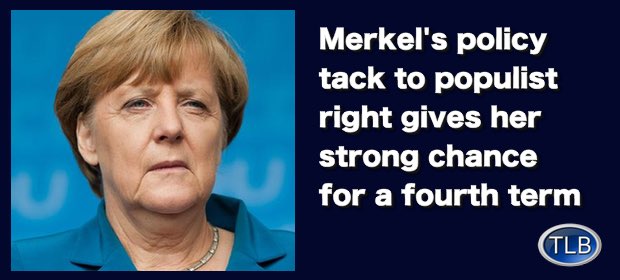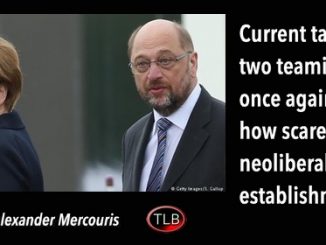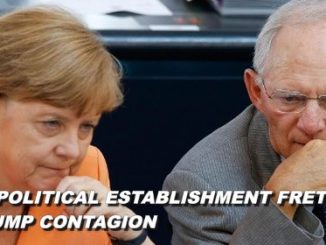
Angela Merkel Scores Big Win to Secure Another Term As Chancellor
PETER KORZUN
Angela Merkel is on course to secure another term as German Chancellor with 49% of Germans giving her their support. A poll conducted by German ARD broadcaster shows that 63 per cent of respondents are pleased with her work, and 72 per cent of those voters back her because she «ensures the people in the country are doing well».
Rhine-Westphalia was the last local election viewed as a bellwether before the national parliamentary elections on September 24, when the Chancellor will seek a fourth term. The Christian Democratic Union (CDU) won around 34% (up from 26.3% in 2012), while the Social Democrats (SPD), which has ruled North Rhine-Westphalia for most of the past half century, fell to around 30% (down from 39%).
This land has traditionally been the leftists’ heartland. They have been in power for almost half a  century (46 of the last 51 years since 1966) but this time the party of Chancellor Angela Merkel scored an upset victory in Germany’s most populous state, which is home to 18 million people and one in five German voters. The coalition of the SPD and the Greens, who won only 6.4%, lost its majority. Armin Laschet, the conservative challenger and deputy leader of the chancellor’s party, is poised to replace Martin Schulz (pictured), Mrs. Merkel’s Social Democratic challenger, who suffered a hard defeat in his home state. The «Schulz effect» appears to have played itself out. His popularity appears to have fizzled badly. The SPD result in the May 14 election was the party’s worst in North Rhine-Westphalia since WWII.
century (46 of the last 51 years since 1966) but this time the party of Chancellor Angela Merkel scored an upset victory in Germany’s most populous state, which is home to 18 million people and one in five German voters. The coalition of the SPD and the Greens, who won only 6.4%, lost its majority. Armin Laschet, the conservative challenger and deputy leader of the chancellor’s party, is poised to replace Martin Schulz (pictured), Mrs. Merkel’s Social Democratic challenger, who suffered a hard defeat in his home state. The «Schulz effect» appears to have played itself out. His popularity appears to have fizzled badly. The SPD result in the May 14 election was the party’s worst in North Rhine-Westphalia since WWII.
The Free Democrats, the chancellor’s traditional allies, showed a good result. They won a strong 12.6% of the vote. The party, which was a partner in the governing coalition with the Christian Democrats in 2009-13, has a good chance to return to the national parliament in September.
The nationalist Alternative for Germany won 7.4 % – enough to give it seats in the state legislature. The party is now represented in 13 out of Germany’s 16 state parliaments. The opposition Left party fell short of the 5% needed to win seats.
Before the May 14 punch, the Social Democrats have suffered two humiliating electoral defeats at the hands of Mrs Merkel’s conservatives, in regional votes in Saarland and Schleswig-Holstein. There is each and every reason to believe that the result of the September election is predetermined.
One of the obvious reasons of the Chancellor’s success is her changed stance on the issue of immigration with many slogans borrowed from the Alternative for Germany Party. Now it’s Angela Merkel, the politician who created the problem, who wants to get tough on asylum seekers and even deport some of them. Looks like the Christian Democrats have managed to convince Germans the refugee crisis is over though, obviously, it’s not. The Chancellor’s party is sparing no promises to intensify the fight against crime, strengthen police and spend more on security. It has a strong economy and low unemployment rates to bolster its chances.
German voters can blame Merkel for EU woes but they hardly have a choice as her Social Democratic challenger has a reputation of being the Brussels bureaucrat who chaired the European Parliament for many years.
When Mrs Merkel comes to power, she’ll have to handle a host of burning issues at home and abroad. The German chancellor will have to lead the way to «multi-speed» Europe, whatever it means. This is a tall order. There is a surge in anti-EU sentiment in Europe. The challenges are multiple. The Union  is going through troubled times and is on the verge of falling apart. The emergence of new alliances within the organization is undermining the unity; rebellion is at the door. Will Mrs Merkel manage to unite with French President Emmanuel Macron (pictured) and come up with fresh, workable ideas? If not, the irritation will grow. Many people in Germany and other European countries will remember who is responsible for the EU’s woes.
is going through troubled times and is on the verge of falling apart. The emergence of new alliances within the organization is undermining the unity; rebellion is at the door. Will Mrs Merkel manage to unite with French President Emmanuel Macron (pictured) and come up with fresh, workable ideas? If not, the irritation will grow. Many people in Germany and other European countries will remember who is responsible for the EU’s woes.
The domestic problem of asylum seekers will only aggravate, terrorist acts will continue to shock the country. The damage has already been done and it’s extremely hard to turn the tide. Each and every time the stories appear in media headlines, voters will remember who bears the responsibility for the situation. And what if Turkey’s President Erdogan pulls out from the migration agreement with the EU, as he says he would?
The economy is strong but it has ups and downs.
The Christian democrats are not the only party to be happy about the local elections. The anti-immigration Alternative for Germany is going strong too. Willy-nilly, the Christian Democrats will have to reckon with this relatively new political force on the German political landscape.
Mrs Merkel may be on the way to victory that may turn into failure and defeat.
There is something very important she can do for Germany and the whole of Europe. If Merkel wins another term, she’ll work in tandem with the German President. Last year, he published an article in the Frankfurter Allgemeine Zeitung daily with proposals to negotiate a new multilateral treaty on conventional arms control in Europe under the OSCE auspices. Later, his arms control initiative received support from more than a dozen leading European nations. By promoting the idea of arms control, Angela Merkel will gain a lot of hearts and minds in Germany and elsewhere in Europe, including Russia. She’ll be pushing the initiative at a most needed time. That’s what the chancellor has up her sleeve to boost her popularity and occupy a special place in history. This issue has undeservedly fallen out of the German election campaign agenda, but there is still time. The G7 summit in Italy on May 25-27 and G20 summit in Hamburg on July 7-8 are the right places to launch discussions on the issue.
************
ER recommends other articles by Strategic Culture Foundation
About the author
Peter Korzun is an expert on wars and conflicts
Featured photo credit: @picture-alliance/dpa/Malte Ossowski/SVEN SIMON




